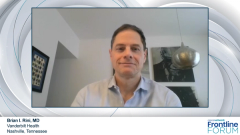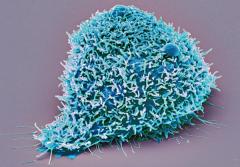
Renal Cell Carcinoma: Overlapping Toxicity in TKI/IO Combination Therapy
Closing out their discussion on adverse event management in advanced renal cell carcinoma, Matthew Campbell, MD, MS, and Brian Rini, MD, consider overlapping toxicity in TKI/IO regimens.
Episodes in this series

Transcript:
Brian I. Rini, MD: Matt, we should probably touch on the IO/TKI [immunotherapy/tyrosine kinase inhibitor] combinations and how you handle overlapping toxicity, which I think is largely diarrhea and LFT [liver function test] abnormalities. I think those are probably the 2 most common that could be from either component of those regimens. If a patient comes in with a 3 to 5 times transaminase elevation 6 weeks into lenvatinib plus pembrolizumab, or cabozantinib plus nivolumab, whatever your favorite regimen is, I guess it’s a little more common with cabozantinib plus nivolumab, how are you approaching that?
Matthew T. Campbell, MD, MS: It’s a great question. We will send our battery of tests for potential immunotherapy-related hepatotoxicity at the start to give us a foundation. If we see something that leaps out at us as having a potential role, we’ll hold therapy at that time of both IO and the TKI. Normally we’re going to recheck patients within around a week to make sure we’re not seeing additional progression.
My feeling is that if, for the LFTs, within a week if the liver transaminases are all trending down, then it’s most likely going to be TKI associated. With that break, as you allow them to come back closer to normal, you normally can then safely resume therapy. Though sometimes that can be a consideration of a dose reduction of the TKI, depending on how high they go. If the liver transaminases are clearly worsening despite the hold of the TKI, that makes me really concerned that it may be immunotherapy related.
We will often try to do a liver biopsy in that setting, which will give us some information about the type of immune cell that may be causing the toxicity, and we’ll start the patients on steroids. I have found for liver toxicity it can be challenging because some of these do require more therapy than steroids to help everything calm down. But we will get our expert hepatology team involved in their care. But I agree with you, it can be a big challenge, but most often with an IO/TKI, holding the TKI for several days or, at times a week, will give some clarity if it’s TKI or IO driven.
Brian I. Rini, MD: I agree. We have a similar approach. I think maybe the couple of things to add are caveats. If a patient’s bilirubin is elevated, then I think that’s IO mediated very likely, or if they just look critically ill, which I think 9 out of 10 patients don’t. Maybe even more than that. For the vast majority of patients, there’s not an urgency to rush them on steroids. That’s what I did in the beginning, the early axitinib plus pembrolizumab days, I don’t know, I was overly nervous about immune-mediated hepatitis and used a lot of steroids when probably it was more TKI related.
We did an analysis from the KEYNOTE-426 trial that looked at hepatotoxicity, and the time to resolution of hepatotoxicity was the same whether patients got steroids or not, which tells you that most of them were not immune-mediated because you’d expect it to be faster. That was a learning experience for me that it’s probably mostly TKI related. Then the holding and rechecking are as you say. We don’t tend to do a ton of liver biopsies. I think we do them if people aren’t resolving, if they might have something else going on, if we think, gosh, there’s other pathology here, and maybe this isn’t entirely from drugs. We do them when we’re scratching our heads a bit, but I don’t think we do it routinely, and I don’t think one approach is right or wrong. I think it’s the same as doing a colonoscopy and biopsy with colitis, sometimes you do it and sometimes you just give steroids and people get better, and it mostly depends on your institution and how quickly you can get things done more than anything.
Matthew T. Campbell, MD, MS: I certainly agree with that. I think diarrhea has been of interest because, at least for us, the TKI-associated diarrhea tends to resolve very quickly even with drugs like cabozantinib that have a longer half-life. But the character tends to be a little different with the pure water kind of scenario with the severe diarrhea that you see with immunotherapy associated, which leads to rapid dehydration and other symptoms. So, we normally can tease that one out too. I don’t know what your experience has been with the IO/TKI diarrhea.
Brian I. Rini, MD: I agree. I think true colitis, immune-mediated colitis, is much more fulminant, people are sicker, they might have a fever. They were fine, and the next day they were not fine. TKI diarrhea is just more of a nuisance, it’s slower in onset, the patients are a little more anorexic, they don’t want to eat. It just has a different flavor.
Matthew T. Campbell, MD, MS: I agree.
Brian I. Rini, MD: There are always exceptions, but that one I think is easier. LFTs are harder because it’s just a laboratory value, and patients often feel fine. I would say 9 out of 10 patients have asymptomatic LFT elevations, even if they’re 10 to 20 times the upper limit of normal. Sometimes it’s a surprise when those labs come back and you’re just about to send the patient up for their infusion. But I think that’s right, and I think that approach of holding the TKI and looking at the time course of resolution to gauge what it’s from, I think it mostly works. We’re all fooled, and I’ve certainly had immune-mediated toxicity where the LFTs came down a little but not a lot, and we didn’t give steroids and then they lingered, and we finally gave steroids, and they got better quickly. So, there are always exceptions, but I think those general principles apply.
Matthew T. Campbell, MD, MS: Yes, and I always think with immunotherapy, you have to hold the drug because the half-life is so long, or the time bound at receptors. So, if you’re ever in doubt, it’s OK to hold and take your time to figure out the toxicity.
Brian I. Rini, MD: I think missing a dose of pembrolizumab is just not a big deal.
Matthew T. Campbell, MD, MS: Right.
Brian I. Rini, MD: Patients don’t want to do it, but I think you just have to reassure them that managing their toxicity is the most important in the big picture, and if they get another dose or two it’s just not going to matter.
Matthew T. Campbell, MD, MS: I agree.
Transcript edited for clarity.
Newsletter
Stay up to date on recent advances in the multidisciplinary approach to cancer.












































